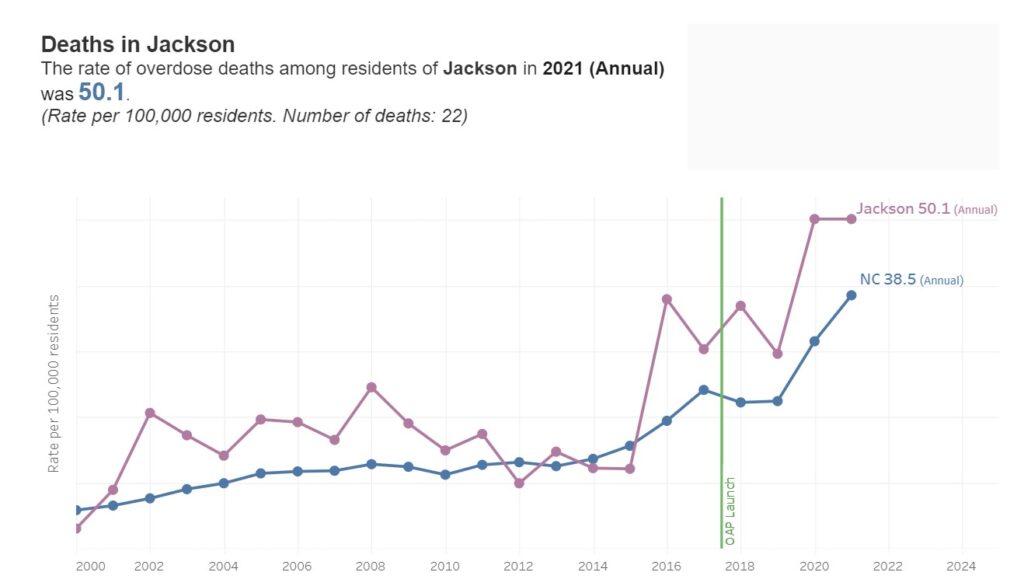Western North Carolina doesn’t have an opioid epidemic.
“We have an addiction epidemic,” said Beth Young, coordinator of the addiction studies program at WCU. After a panel conversation about the opioid crisis in Western North Carolina, It’s clear the situation is getting worse.
The panel was part of the pre-literary festival event to promote one of the main speakers, Beth Macy. She is presenting her non-fiction work “Dopesick” and “Lazarus” Project on the opioid crisis in the U.S. as part of the WCU’s 21 Annual Spring Literary Festival.
The audience of around 30 people heard from Greg Christopher, a long-time Haywood sheriff, about the crisis from a law enforcement perspective, a nurse and healthcare professional Jessica Shuford talked about what healthcare and prevention can do. Ben Farlow, program director of October Road, behavioral health & rehabilitation center, talked about the program and how to better serve the community. Kelly Teague, regional director for Community Impact NC, emphasized the importance of working together and finding common ground to reach the common goal, to help others.
All speakers at the panel agreed that numbers for substances and deaths in WNC are increasing, and it’s creeping into lower age groups.

The graph above is an opioid dashboard from the State of North Carolina Department of Health and Human Services, which shows overdose deaths in Jackson County surpassing the state average.
“This metric includes deaths involving all types of medications and drugs: opioids (commonly prescribed opioids, heroin, and synthetic narcotics like fentanyl and fentanyl-analogues), stimulants (cocaine, methamphetamine), benzodiazepines, and others. This metric includes fatal overdoses of all intents; over 90% of these deaths are unintentional.”
(Graph from official North Carolina website)
One notable observation is the sharp spike in 2020 for Jackson County, which was also the beginning of the COVID-19 pandemic.
Purpose
The event at WCU was intended to bring awareness to a “commonly misunderstood issue, and group of people,” said Farlow.
Christopher, with 43 years in law enforcement and a former sheriff in Haywood County (2013-2022), sees “intelligent, professional businessmen supplying the drugs,” to be a primary part of the issue.
“It’s about supply and demand. In 2013, I wasn’t aware of any heroine in Haywood County. But in 2014, we began arresting people for black tar heroin regularly. The price for opioids and meth started going down, making them more accessible,” said Christopher.
Christopher and Farlow mentioned that fentanyl and methamphetamines are the most-used drugs in WNC and have caused many deaths. But alcohol is becoming a large issue too. After COVID, many young people turned to alcohol, resulting in frightening and tragic experiences for many families, according to Teague.
What can we do to help?
When asked about solutions, Christopher mentioned the Medicaid expansion, saying, “It’s working in other states, and it’s being heavily discussed in Raleigh. If you know anyone legislative-wise that you could mention medication expansion, let them know.”
The panel agreed with Christopher.
Farlow believes an expansion of harm-reduction resources and sites for people to use clean vaccines could help.
“These places reduce the stigma of drug users feeling shamed, which can bring people out of hiding. If someone is dead, we can’t help them,” said Farlow.
North Carolina, like many other states in the U.S., doesn’t have safe injection sites as a harm-reduction strategy because opioids are still a criminal offense and people could go to jail for having such programs. Even clean needle exchanges are programs seen as encouraging rather than discouraging drug use.
While beliefs about the “best” way to solve the issue vary, most agree the solution starts by having conversations about the topic.
“Whether it’s your family, friends, or legislative leaders, just talk to them! Anything to bring awareness will help,” said Young.
“There are resources available, but sometimes they are hard to find. Sharing information about these can be a tremendous help,” said Teague.
Local resources (not an extensive list)
Land of Sky Regional Council– Provides community-based peer support services for people reentering the workforce after being discharged from treatment or released from prison.
Smoky Mountain Harm Reduction– Provides sterile syringes and basic medical resources/information.
Appalachian Community Services- Provides outpatient therapy and various programs/services for all age groups


